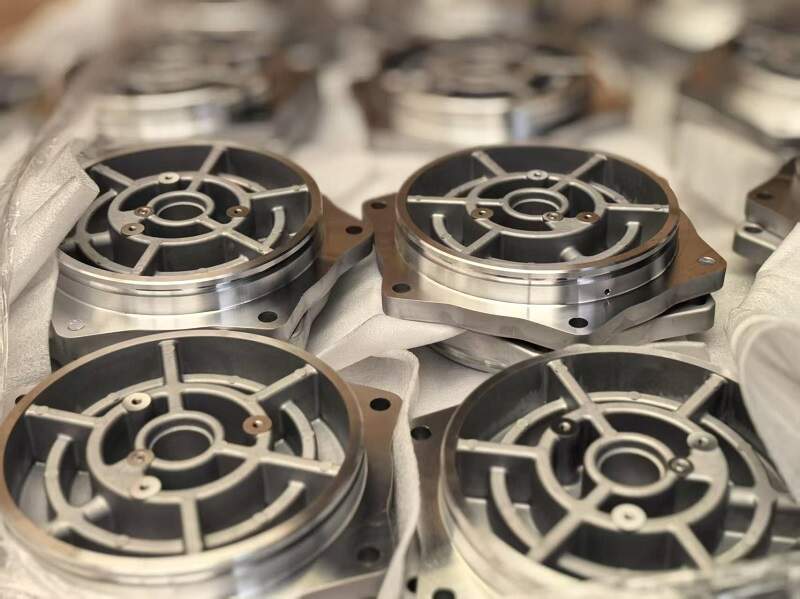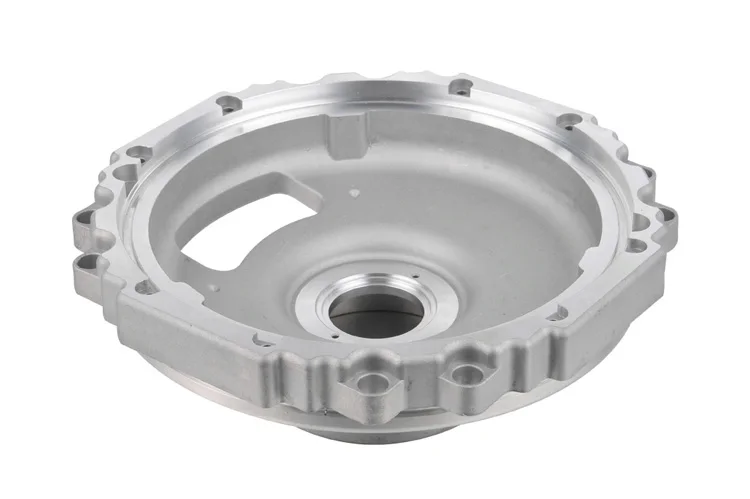The Future of Aluminum Foundries: Innovations and patterns Shaping the Sector
The light weight aluminum foundry market is undertaking substantial change. Secret fads highlight the significance of sustainability and effectiveness. Innovations in clever production and automation are coming to be prevalent. Shops are increasingly concentrated on utilizing recycled products. This change raises questions regarding future practices and modern technologies. Just how will these adjustments influence production techniques and market characteristics? The solutions may redefine the market landscape in unanticipated ways.
Innovations in Smart Manufacturing Technologies
As the aluminum shop sector develops, advancements in smart manufacturing innovations are becoming progressively essential for enhancing performance and effectiveness. The combination of automation, artificial intelligence, and the Net of Things (IoT) is transforming typical foundry operations. These innovations make it possible for real-time surveillance of procedures, allowing for prompt changes that optimize output and decrease waste.
In addition, artificial intelligence algorithms examine production information to identify patterns and forecast maintenance demands, lessening downtime. Robotics are significantly employed for repeated tasks, releasing experienced employees to concentrate on more complicated challenges. In addition, electronic twins-- virtual designs of physical processes-- promote simulations that can improve layout and operational strategies.
The fostering of these smart production technologies is driving affordable advantages in the light weight aluminum foundry market. By improving workflows and improving decision-making capabilities, shops can satisfy growing market demands while keeping high-quality criteria. The future of aluminum shops is undeniably linked to these technical developments.
Welcoming Eco-Friendly Materials and Processes
The aluminum shop sector is increasingly concentrating on environment-friendly materials and procedures to improve sustainability. This change includes the fostering of sustainable product sourcing, energy-efficient production strategies, and efficient recycling and waste management methods. By incorporating these methods, shops aim to minimize their ecological impact while maintaining competitiveness in the market.
Sustainable Material Sourcing
Exactly how can light weight aluminum factories improve their sustainability initiatives? Sustainable material sourcing has actually emerged as a crucial technique in attaining this objective. By prioritizing recycled light weight aluminum, foundries can significantly decrease their ecological footprint, as recycled materials require less energy and fewer resources contrasted to main aluminum manufacturing. Additionally, sourcing products from certified suppliers who comply with environmentally friendly techniques advertises responsible mining and reduces environmental effect. Factories are additionally exploring alternative materials, such as biopolymers and environmentally friendly layers, to match conventional aluminum processes. Teaming up with stakeholders, consisting of vendors and environmental organizations, cultivates advancement in sourcing strategies. Ultimately, embracing sustainable material sourcing not just lines up with international sustainability goals but also positions light weight aluminum shops as leaders in eco accountable manufacturing.
Energy-Efficient Manufacturing Techniques
Aluminum shops are significantly adopting energy-efficient production methods to complement their lasting product sourcing efforts. These methods focus on reducing energy consumption throughout the production process. Advanced innovations, such as induction melting and optimized spreading procedures, are being executed to decrease the overall carbon impact. In addition, automation and wise manufacturing systems boost operational performance, enabling for better power administration. Foundries are additionally checking out the integration of eco-friendly power resources, such as solar and wind, to power their procedures. By prioritizing power performance, aluminum shops not only reduced production costs however also align themselves with international sustainability objectives, guaranteeing a more eco liable technique to aluminum manufacturing while meeting the rising demand for eco-friendly methods in the market.
Recycling and Waste Administration
Embracing environmentally friendly products and processes, light weight aluminum foundries are prioritizing recycling and waste monitoring techniques to improve sustainability in their procedures. By incorporating closed-loop systems, these centers are decreasing waste and optimizing source efficiency. Scrap aluminum, a conveniently available material, is being recycled on-site, substantially reducing the need for virgin products and decreasing energy consumption. Innovations in sorting and processing innovations even more assist in the recycling of light weight aluminum, making certain that even contaminated materials can be repurposed successfully. In addition, shops are taking on lasting techniques such as reducing contaminated materials and advertising making use of biodegradable products for product packaging. This dedication to reusing not just decreases ecological influence yet additionally boosts the financial stability of light weight aluminum shops in a competitive market.
The Role of Automation and Robotics
Automation and robotics are progressively transforming the aluminum foundry industry, considerably improving production effectiveness. By integrating sophisticated technologies, foundries can reduce labor costs while simultaneously enhancing safety and security requirements for their workforce. This shift not just enhances operations yet additionally positions the industry for lasting growth in a competitive market.
Enhanced Production Performance
Changing production procedures, the assimilation of advanced robotics and automation innovations has actually ended up being a foundation for light weight aluminum foundries looking for improved effectiveness. These innovations simplify workflows, lower cycle times, and improve product high quality by reducing human mistake. Automated systems can keep an eye on production lines in you could try this out real-time, permitting instant adjustments that enhance output. On top of that, robotics help with the handling of hazardous materials, making sure safer workplace while boosting throughput. Anticipating upkeep technologies likewise add to performance by anticipating devices failings, thereby minimizing downtime. Consequently, aluminum factories can achieve greater consistency in their items while responding more quickly to market needs. This welcome of automation is setting a new requirement for performance and functional quality within the industry.

Reducing Labor Prices
The shift towards progressed robotics and automation in light weight aluminum shops not just boosts manufacturing performance however additionally plays a significant role in decreasing labor costs. By integrating automated systems, foundries can minimize the reliance on manual labor, which typically includes high salaries and training costs. Robotics improve repetitive tasks such as putting, molding, and ending up, permitting a higher result with less workers. This technological change not just minimizes labor-related expenses however also improves consistency and high quality in production. Moreover, automation can run around the clock, making best use of operational hours without the associated prices of overtime or shift differentials. Because of this, aluminum shops can accomplish significant savings while keeping affordable prices in a progressing market landscape.
Improving Safety And Security Requirements
While standard aluminum factory operations typically subject workers to harmful environments, the assimilation of robotics and automation greatly enhances security standards within the industry. Automated systems can execute high-risk jobs, such as liquified steel handling and heavy lifting, decreasing human exposure to harmful problems. Furthermore, robotics can run in harmful ambiences and severe temperatures, effectively lessening the threat of injury. Advanced keeping an eye on modern technologies and synthetic knowledge assurance real-time security evaluations, permitting for immediate reactions to prospective dangers. Moreover, automation simplifies workflows, decreasing the probability of crashes caused by human error. As a result, the adoption of these innovations not only enhances safety and security yet also promotes a much more effective and effective workplace in light weight aluminum factories.
Enhancing Power Performance in Manufacturing
As light weight aluminum shops look for to preserve competition in an advancing market, improving power effectiveness in manufacturing has become an important emphasis. By embracing advanced innovations such as high-efficiency melting heating systems and automated temperature controls, foundries can notably reduce power usage. Carrying out real-time surveillance systems permits precise monitoring of power use throughout the production procedure, allowing quick adjustments to optimize effectiveness.
Furthermore, shifting to different power sources, consisting of sustainable options, can further decrease the carbon footprint. The assimilation of energy recovery systems, which reclaim waste heat for reuse, is coming to be increasingly typical. Training personnel in energy monitoring methods assures that everybody associated with the manufacturing process bears in mind power usage.
These campaigns not only reduced functional prices yet also align with global sustainability objectives, positioning light weight aluminum shops as responsible gamers in the industry while improving their overall competition. - Aluminum Foundry
Technologies in Recycling Aluminum
Advancements in reusing light weight aluminum have actually obtained energy together with efforts to boost energy performance in manufacturing. The light weight aluminum market has actually welcomed sophisticated technologies that enhance the reusing process, minimizing power intake and environmental effect. Techniques such as hydrometallurgy and brand-new sorting modern technologies improve the extraction of aluminum from scrap, enhancing yield rates and making sure better recycled product.
Additionally, the advancement of closed-loop recycling systems allows factories to reuse aluminum without substantial destruction in high quality, making the procedure extra sustainable. Developments in logistics and collection, consisting of improved radar and automated sorting, have also played an important role in increasing the performance of light weight aluminum recuperation. These developments not just contribute to a round economic climate but also help reduce the carbon footprint connected with light weight aluminum production. As the need for lasting techniques expands, these advancements position the light weight aluminum foundry sector as a leader in liable source monitoring.
Reacting To Market Needs and Consumer Trends
Versatility has come to be a cornerstone for aluminum foundries replying to evolving market needs and consumer fads. As markets progressively prioritize sustainability, aluminum factories are changing towards eco-friendly methods, consisting of boosted reusing processes and minimized carbon footprints. This change straightens with consumer preferences for eco accountable products, driving shops to innovate their Go Here offerings.
Additionally, the surge of lightweight products in aerospace and auto industries demands improvements in aluminum alloys and casting strategies. Foundries are buying r & d to generate high-strength, lightweight elements learn this here now that fulfill stringent performance standards.
Furthermore, modification has gotten grip, with consumers looking for customized services. Light weight aluminum foundries are leveraging innovative manufacturing modern technologies, such as 3D printing, to fit details client requirements effectively. This responsiveness not just pleases consumer demands however likewise placements light weight aluminum foundries competitively in a dynamic market landscape, ensuring their significance in an ever-changing commercial setting.

Regularly Asked Concerns
How Do Aluminum Foundries Effect Local Economies?
Light weight aluminum shops substantially affect regional economic situations by producing tasks, stimulating demand for neighborhood suppliers, and contributing to community growth. Their procedures commonly result in enhanced tax earnings, which can fund important public solutions and infrastructure renovations.
What Are the Security Rules for Light Weight Aluminum Factory Employees?
Safety and security guidelines for aluminum foundry workers include obligatory personal protective devices, proper ventilation systems, normal training on dangerous materials, and adherence to guidelines set by job-related wellness and security managements to reduce dangers and guarantee employee security. - Aluminum Casting Company
Exactly How Does Light Weight Aluminum Recycling Affect Global Supply Chains?
Aluminum reusing considerably minimizes demand for basic materials, enhances resource efficiency, and stabilizes rates. This shift effects international supply chains by promoting a round economy, promoting sustainability, and ensuring a much more resistant industry in varying markets.
What Occupation Opportunities Exist in the Light Weight Aluminum Foundry Industry?
Different job opportunities exist in the light weight aluminum factory industry, including duties in design, quality control, production administration, and r & d. Proficient labor placements such as mold and mildew makers and maker drivers are additionally sought after.
Exactly How Do International Profession Plans Influence Light Weight Aluminum Foundries?
International profession plans significantly influence light weight aluminum foundries by impacting import tolls, supply chain characteristics, and market access. These elements can affect functional costs, competition, and overall profitability within the worldwide aluminum manufacturing landscape.
By prioritizing recycled aluminum, foundries can significantly minimize their ecological impact, as recycled products need less energy and less resources compared to primary aluminum production. Aluminum foundries are increasingly adopting energy-efficient manufacturing strategies to enhance their sustainable material sourcing initiatives. Automation and robotics are increasingly transforming the aluminum foundry industry, considerably enhancing manufacturing performance. The shift towards progressed robotics and automation in light weight aluminum shops not just improves manufacturing effectiveness however also plays a significant role in reducing labor prices. As light weight aluminum factories seek to maintain competitiveness in a developing market, enhancing power performance in production has actually emerged as an essential emphasis.